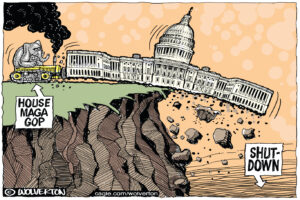Bush the Saboteur
The president's strategy is to fake out the public so that it believes Democrats in Congress can't perform basic governmental tasks. Is this any way to run a country?WASHINGTON — If a candidate for any office ran on a promise to render government dysfunctional — to destroy its capacity to work on behalf of something roughly considered to be the common good, to assure that bitter division and not even a grudging tilt toward compromise would prevail — it is reasonable to assume that voters would recoil. This would surely be true if the office-seeker aspired to a seat on the local sewer commission.
President Bush did not run for the White House on such a platform. But it is how he has governed, and how he seems to see his role — now more than ever. The predisposition has grown since the Democrats won control of Congress, an event that might have punctured the bubble of disinformation around Bush, but which seems only to have reinforced it.
The crisis now at hand, besides Iraq, is how to finance the most basic operations of the federal government. It is a manufactured impasse, since Congress has actually made quicker progress in approving routine spending bills this year than in most. The House already has passed its dozen appropriations bills. This compares with none — zero — passed when Republicans led the chamber last year. When the Democrats began running the House in January, their first cleanup chore was completing that leftover task.
The more deliberate Senate has passed four spending measures. This incomplete record is one reason Congress must pass one of those “continuing resolutions” that always seem to the public to symbolize political indolence. But this bit of housekeeping to keep the government operating after Oct. 1 shouldn’t be confused with the more significant reason a budget crisis is brewing — the reason there is the potential to repeat the infamous government shutdown of 1995.
Bush, having declined to veto a single spending measure when Republicans controlled Congress, says he wants to veto just about all of them now. It is perhaps too near the twilight of his presidency to call Bush on this latest hypocrisy — and anyway, the repetition is tiresome. Better to illuminate the picayune nature of the fight Bush picks.
The dispute is over a total — spread among all the spending bills — of $22 billion that Bush himself did not call for. That amounts to about 2 percent of federal spending that is subject to annual appropriations by Congress. How else to put it in perspective? Military operations in Iraq and Afghanistan are costing nearly $10 billion every month.
The president’s point isn’t to force negotiations over a piddling sum. It’s to fake out the public so that it believes Democrats can’t perform basic governmental tasks. Having already failed to bring an end to the Iraq crisis — because the president and his remaining Republican allies on Capitol Hill won’t allow it — Democrats are now to stand accused of botching the budget, too. A second goal is to rally the Republican conservative “base” before next year’s elections. A third is more cynical: The pox-on-both-their-houses story line that typically accompanies budget showdowns turns off independent voters.
Still, many Republicans are increasingly isolated from their president. The four spending measures so far passed in the Senate have overwhelming bipartisan support. The tallies: homeland security, 89-4; military construction and veterans, 92-1; State Department and foreign operations, 81-12; transportation and housing, 88-7.
The House spending bills also drew bipartisan support, with an average of more than 50 Republican votes, according to an analysis by the Appropriations Committee staff. But generally speaking, there won’t have been enough Republican votes to override Bush’s expected vetoes. Once again, House Republicans will control the outcome, irrespective of their losses last November.
The fakery was best expressed by Bush, who last week gave himself the grade of “A” for “keeping taxes low and being fiscally responsible with the people’s money.” It so happens that on Bush’s watch — and with Republicans in control of Capitol HiIl — the federal budget swung from an anticipated 10-year surplus of $5.6 trillion to an expected deficit of $2.8 trillion. This reversal of fiscal fortune has swelled the debt and driven the annual cost of interest on it to $261 billion in fiscal 2008, more than 10 times the amount that is to be so hotly disputed this fall.
The numbers will not matter because the point is to show that Democrats cannot win for having won. This may be the only strategy Bush sees. But it’s no way to run a sewer commission.
Marie Cocco’s e-mail address is mariecocco(at)washpost.com.
© 2007, Washington Post Writers Group
Your support matters…Independent journalism is under threat and overshadowed by heavily funded mainstream media.
You can help level the playing field. Become a member.
Your tax-deductible contribution keeps us digging beneath the headlines to give you thought-provoking, investigative reporting and analysis that unearths what's really happening- without compromise.
Give today to support our courageous, independent journalists.






You need to be a supporter to comment.
There are currently no responses to this article.
Be the first to respond.